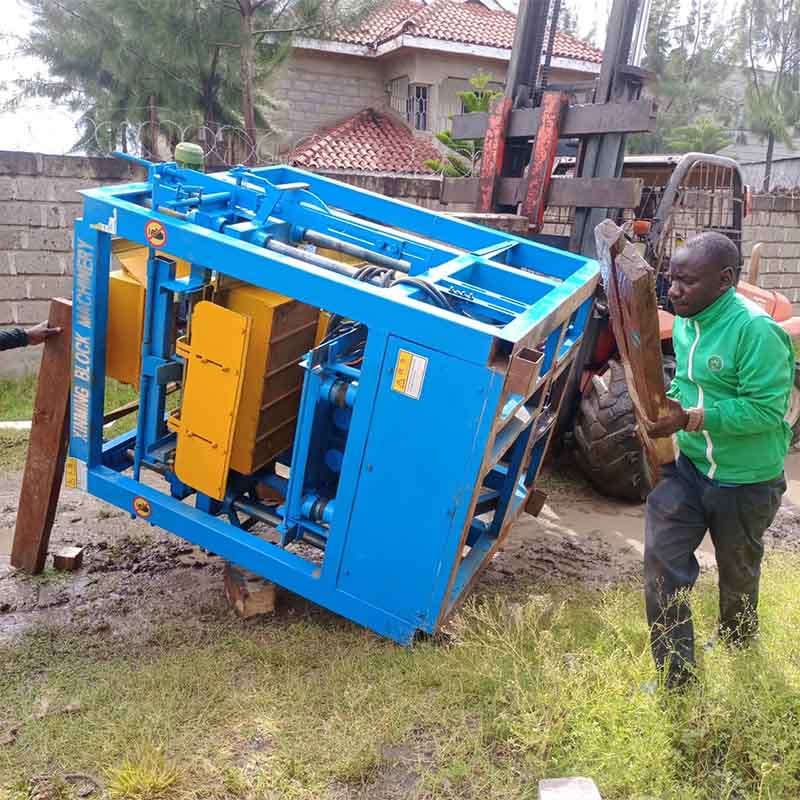
Title: **Revolutionizing Production: The Indispensable Role of Robotics in Full-Automatic Block Manufacturing**
Introduction:
In the contemporary landscape of manufacturing, the integration of robotics has become a defining factor in enhancing efficiency, precision, and scalability. The full-automatic block manufacturing industry is no exception, as robotics play a pivotal role in transforming traditional production processes. This article delves into the multifaceted contributions of robotics in full-automatic block manufacturing, exploring how these advanced technologies are reshaping the way concrete blocks are produced.
1. **Automated Material Handling:**
One of the primary contributions of robotics in full-automatic block manufacturing is the automation of material handling processes. Robotics systems are adept at lifting, transporting, and placing raw materials with precision. Whether it’s loading aggregates, cement, or other components into the production line, robotic arms and conveyor systems streamline the material handling phase, minimizing manual intervention and reducing the risk of errors.
2. **Precision in Block Formation:**
Robotic systems bring an unprecedented level of precision to the block formation process. From molding and compaction to curing, robots ensure consistent quality and dimensional accuracy. The use of robotic arms equipped with advanced sensors allows for real-time adjustments, optimizing the production parameters to meet stringent quality standards. This level of precision contributes to the creation of durable and uniform full-automatic blocks.
3. **Efficient Mixing and Batching:**
Robotics technology has revolutionized the mixing and batching of materials in full-automatic block manufacturing. Automated systems, guided by robotic control, accurately measure and mix the raw materials, ensuring the precise formulation of concrete mixtures. This not only enhances the quality of the blocks but also reduces material waste, making the manufacturing process more sustainable.
4. **Customization and Flexibility:**
Robotic systems offer a high degree of flexibility and adaptability in full-automatic block manufacturing. With programmable controls, robotic arms can quickly switch between different block sizes, shapes, and specifications. This capability enables manufacturers to respond swiftly to changing market demands and customize their product offerings without the need for extensive retooling or downtime.
5. **Quality Inspection and Assurance:**
The incorporation of robotics in full-automatic block manufacturing facilitates advanced quality inspection and assurance processes. Vision systems and sensors integrated into robotic arms can perform detailed inspections of each block, identifying defects, inconsistencies, or imperfections. This level of automated quality control ensures that only high-quality blocks reach the end of the production line, minimizing the likelihood of defects in the finished products.
6. **Optimized Maintenance and Predictive Analytics:**
Robotics systems contribute to the efficient maintenance of full-automatic block manufacturing equipment. Automated robotic arms often come equipped with self-diagnostic capabilities, allowing them to monitor their own performance. Additionally, predictive analytics algorithms analyze data from sensors to anticipate potential maintenance needs. This proactive approach minimizes downtime, reduces maintenance costs, and ensures the continuous operation of the manufacturing line.
7. **Enhanced Safety Measures:**
The integration of robotics enhances safety measures in full-automatic block manufacturing. By automating tasks that pose risks to human workers, such as heavy lifting or exposure to hazardous materials, robots contribute to a safer working environment. Collaborative robots, or cobots, are designed to work alongside human operators, further improving overall workplace safety.
8. **Increased Production Speed and Scalability:**
Robotics technology significantly boosts the speed and scalability of full-automatic block manufacturing. Automated processes, guided by robotic precision, operate at higher speeds than traditional manual methods. Moreover, robotic systems can be easily scaled to accommodate increased production volumes, allowing manufacturers to meet growing market demands efficiently.
Conclusion:
In the realm of full-automatic block manufacturing, robotics emerge as indispensable partners in revolutionizing production processes. From material handling and block formation to quality inspection and maintenance, robotics technology enhances efficiency, precision, and safety. As the industry continues to embrace automation and smart manufacturing, the role of robotics in full-automatic block manufacturing is poised to evolve, driving innovation and shaping the future of construction material production.
